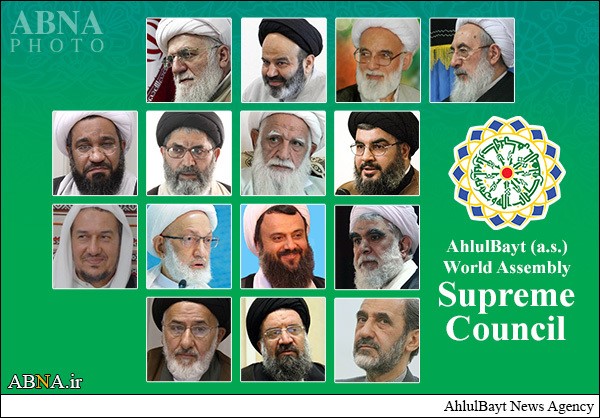Overview:

The Ahlul Bayt World Assembly (ABWA) is an internationally active Iranian NGO which functions as the umbrella over a network of Iranian-backed religious, cultural, and educational institutions tasked with disseminating Ayatollah Khomeini’s revolutionary Islamist ideology around the world. Ahlul Bayt refers to the “People of the House (of the Prophet),” and in the Iranian context specifically refers to Shi’a Muslims (partisans of, or Shi’at ‘Ali). The ABWA is functionally the link between the Iranian Shi’a clerical establishment and foreign Shi’a clerics, and also links Shi’a communities around the world to each other.
According to its website, the primary goals of the ABWA include:
- Restoration and promotion of pure [Shi’a] Islamic teachings & culture as prescribed genuinely by the Holy Prophet of Islam;
- Creating and reinforcing solidarity among all members of the whole Islamic World, especially the followers of the Ahlulbayt;
- Cooperation for development and promotion of cultural, economic, social, and political conditions and living standards of followers of the Ahlulbayt (a.s.) worldwide; and
- Defending the oppressed Shi’a Muslims against the propagandistic attacks of western media.
Iranian Backers:
The ABWA was established in 1990 by Supreme Leader Khamenei as the codification of an initial summit which brought together 300 followers of Khomeinist Shi’a Islam. The organization acts as a transnational propaganda arm for the Supreme Leader, extending his soft power reach and amplifying his messaging capabilities. The organization’s four secretary generals to date (Ayatollah Mohammad-Ali Taskhiri, Dr. Ali-Akbar Velayati, the late Ayatollah Mohammad-Mahdi Asefi, and Ayatollah Mohammad-Hasan Akhtari) have been trusted confidantes and advisors close to the Supreme Leader, ensuring that the ABWA works toward the fulfillment of Khamenei’s preferred diplomatic initiatives. According to Tashkiri, the ABWA’s first Secretary General, the organization seeks to gain supremacy “over all Islamic groups active in the areas of culture, propaganda, economics, society, and politics via peaceful propaganda and persuasion, and to implement the Iranian claim to leadership over all Shi‘i communities in the world.”
ABWA’s policy agenda is determined by its Supreme Council, comprised of leading Shi’a figures from Iran and other nations with large Shi’a concentrations. Notably, Hezbollah Secretary General Hassan Nasrallah sits on ABWA’s Supreme Council. ABWA’s Secretary General is the organization’s chief executive, tasked with implementing the Supreme Council’s policy objectives. The current Secretary General, Mohammad-Hasan Akhtari, was one of the founders of Hezbollah and also previously served as Iran’s ambassador to Syria on two separate occasions. A 2009 interview with Arabic newspaper Al-Sharq Al-Awsat referred to Akhtiar as “the operational father” of Hezbollah, “engineer of the special relationship” between Syria and Iran, and “coordinator of Iran’s relations with Palestinian organizations in Damascus.”
Under Akhtari, ABWA’s network of religious organizations, cultural centers, and charities reportedly collaborates with the Quds Force, providing “an effective cover for assisting with intelligence-gathering; spotting and recruiting foreign students; and moving money and materiel destined for Qods Force (and MOIS) operations.” Akhtari allegedly leverages his extensive experience in the Levant to advance covert action with the Quds Force wherever possible, which includes propagating regime ideology to local populations in Quds Force theaters of operation in order to win over hearts and minds.
Revolutionary Activities Abroad:
The ABWA plays an administrative role, facilitating relationships with local branches and affiliated religious and cultural organizations around the globe. Many of the localized organizations profiled in this report, such as the Islamic Centre of Hamburg and World Ahlul Bayt Islamic Mission in Britain, operate under the aegis of the ABWA, and receive material and planning support from the parent organization. ABWA publishes Islamic books, magazines, software, and cultural products in different languages which it disseminates at its sub-organizations; helps arrange pro-Iranian seminars and conferences; sponsors religious activists and Shi’a preachers to speak; and undertakes charitable endeavors at the local branches worldwide. Many of the Ahlul Bayt-affiliated organizations also play leading roles in staging annual Quds Day celebrations in their respective localities.
Ahlul Bayt World Assembly also acts as a research institution and publishing house geared toward furthering Iran’s regional objectives. On December 15, 2021, ABWA convened a conference titled “Study of the priorities and strategies for disseminating the teachings of the Ahlul Bayt in the international arena; with emphasis on the Indian Subcontinent, Southeast Asia and Latin America regions,” in which Secretary-General Ayatollah Reza Ramazani made remarks on the importance of area studies within ABWA and unveiled books recently published by ABWA. The Deputy for Scientific and Cultural Affairs took the occasion to launch a “Book Council,” with the stated goal of convening “experts, scholars, and professors from different regions of the countries… [to study] regional needs and priorities of different regions.” The “Book Council” thus underscores how ABWA strives to tailor research products to target audiences across the globe. In Indonesia, for example, ABWA ordered the translation and publication of two books in cooperation with the Jakarta Islamic Center. One of the books, “Islamic Revolution; Principles and Features,” focuses explicitly on the need to establish an Islamic government through revolution and presents Khomeini’s thoughts on such topics as Islamic revolution. These ideas could have a destabilizing effect in the majority Sunni Muslim nation, whose government recognizes all major religions with the exception of Judaism.